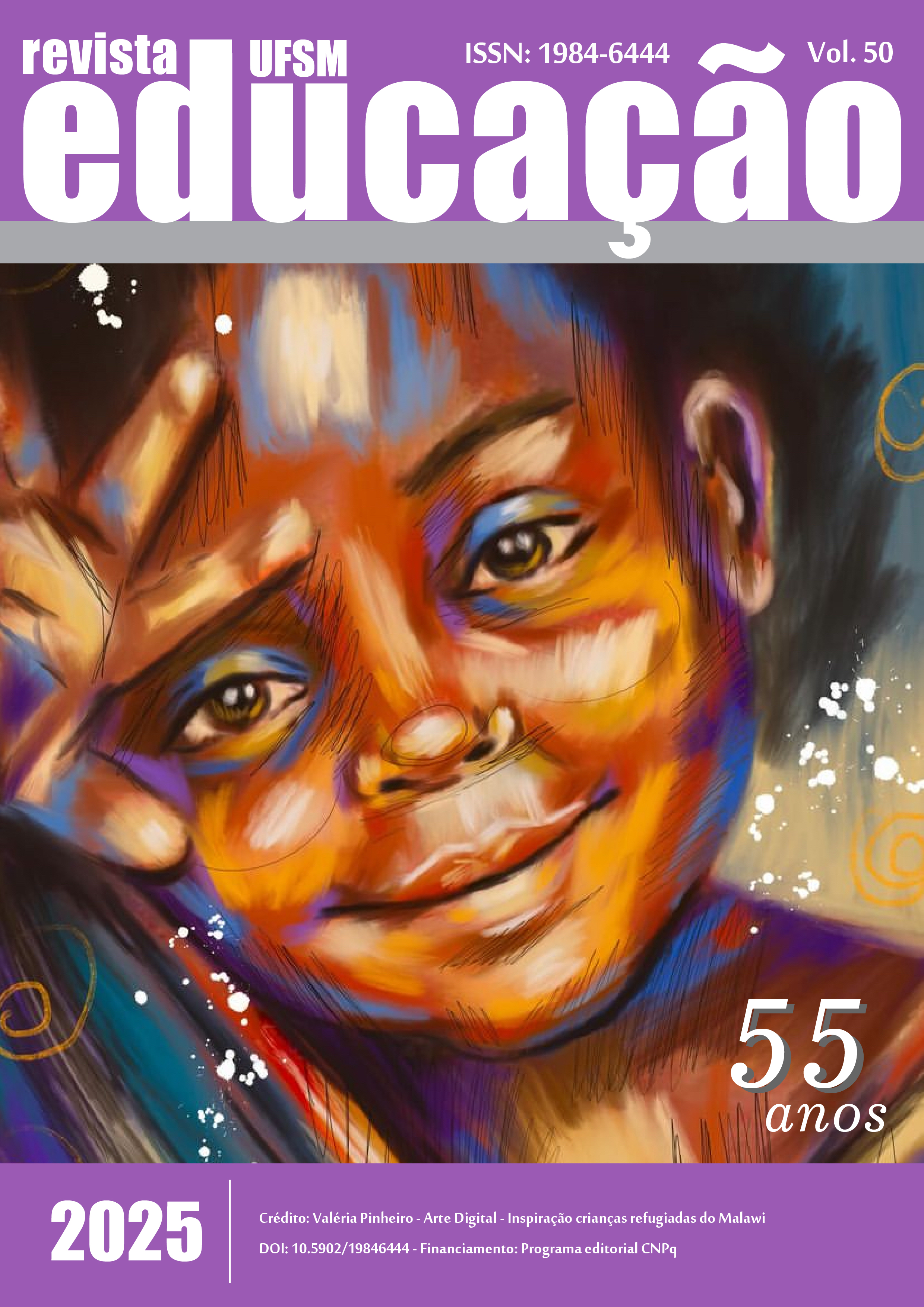From remote teaching during the covid-19 pandemic to the in-person return to classes: challenges of teaching in professional and technological education and the effects on learning
DOI:
https://doi.org/10.5902/1984644485944Keywords:
Remote teaching, Covid-19, Professional and technological educationAbstract
This article was based on observations carried out at the Santo Antônio de Pádua Campus of the Instituto Federal Fluminense (IFFLUMINENSE) since the beginning of remote teaching, in 2020, until the in-person return to classes in 2022. The initial assumption is that this pedagogical process of remote teaching and also related to the in-person return has been permeated by challenges. The aim is to identify some of these challenges for teaching planning and student learning. The data collection instruments were bibliographical and documentary research and the application of a quantitative and qualitative questionnaire to teachers. The results suggest that many of the teachers have faced challenges in their pedagogical practice, some of them being accessibility to technology resources, institutional incentives, adaptation of study resources and materials, as well as the methodology for assessment activities. It was also noticed that the return to in-person teaching had challenges, including managing to carry out all the planning planned for the class, due to the fact that students were unable to follow the content, suggesting that the time spent teaching remotely affected the student’s learning, especially given that it is a professional and technological education school. The relevance of continuing the research already produced on the topic in question is highlighted, as well as new studies aimed at contributing to the educational process.
References
APPENZELLER, Simone. et al. Novos Tempos, Novos Desafios: Estratégias para Equidade de Acesso ao Ensino Remoto Emergencial. Rev. Bras. Educ. Med. [online]. 2020, vol.44, suppl.1, e155. Epub 24-Set-2020. ISSN 1981-5271. Disponível em:<http://educa.fcc.org.br/pdf/rbem/v44s1/1981-5271-rbem-44-s1-e155.pdf>. Acesso em 05 jan. 2023.
BACICH, Lilian.; NETO, Adolfo Tanzi.; TREVISANI, Fernando de Mello. (Org.). Ensino híbrido: personalização e tecnologia na educação. Porto Alegre: Penso, 2015.
BRASIL. Constituição da República Federativa do Brasil de 1988. Brasília, DF: Presidente da República, [2016]. Disponível em: <https://www.planalto.gov.br/ccivil_03/constituicao/constituicao.htm>. Acesso em 21 dez. 2022.
BRASIL. Ministério da Educação. Conselho Nacional da Educação. Nota de Esclarecimento - Covid-19. 2020. Disponível em:<http://portal.mec.gov.br/index.php?option=com_docman&view=download&alias=142021-nota-de-esclarecimento-covid-19&category_slug=fevereiro-2020-pdf&Itemid=30192>. Acesso em 04 ago. 2022.
BRASIL. Ministério da Educação. Conselho Nacional da Educação. Parecer n.º 05/2020. Reorganização do calendário escolar. 2020. Disponível em: <https://normativasconselhos.mec.gov.br/normativa/pdf/CNE_PAR_ CNECPN52020.pdf>. Acesso em 04 ago. 2022.
BRASIL. Ministério da Educação. Secretaria de Educação Profissional e Tecnológica. Instituto Federal de Educação, Ciência e Tecnologia Fluminense. Resolução Consup n.º 38 de 27 de agosto de 2020. Estabelece diretrizes para realização de Atividades Pedagógicas Não Presenciais. 2020. Disponível em: <https://cdd.iff.edu.br/documentos/resolucoes/2020/resolucao-33>. Acesso em 22 dez. 2022.
BRASIL. Secretaria de Educação Profissional e Tecnológica: Saiba o que é a EPT e conheça os principais atores que operam na normatização e na oferta desta modalidade educacional. Disponível em:<http://portal.mec.gov.br/educacao-profissional-e-tecnologica-ept#:~:text=A%20educa%C3%A7%C3%A3o%20profissional%20e%20tecnol%C3%B3gica,e%20na%20vida%20em%20sociedade>. Acesso em: 30 ago. 2022.
BURGESS, Simon.; SIEVERTSEN, Hans Henrik.. Escolas, habilidades e aprendizado: o impacto do COVID-19 na educação. VOX. p. 1 - 4. 2020. Disponível em: <https://voxeu.org/article/impact-covid-19-education>. Acesso em 29 mai. 2022.
GUSSO, Hélder Lima et al. Ensino Superior em Tempos de Pandemia: Diretrizes à Gestão Universitária. Educ. Soc., Campinas, v. 41, e238957, 2020. Disponível em: < https://www.scielo.br/j/es/a/8yWPh7tSfp4rwtcs4YTxtfr/?format=pdf&lang=pt>. Acesso em 08 nov. 2022.
KNECHTEL, Maria do Rosávio. Metodologia da pesquisa em educação: uma abordagem teórico-prática dialogada. Curitiba, PR: Intersaberes, 2014.
MASETTO, Marcos Tarciso. Competência pedagógica do professor universitário. São Paulo: Summus, 2003.
MATTEI, Lauro.; HEINEN, Vicente Loeblein. Impactos da Crise da Covid-19 no mercado de trabalho brasileiro. Revista de Economia Política, v.40, n.4, p.647-668, 2020.
NÓVOA, Antônio. Palestra proferida na abertura da Formação Continuada Territorial à Distância, Salvador (Bahia), abr. 2020. Disponível em:<https://www.youtube.com/watch?v=wx-deAxdegE>. Acesso em 08 set. 2022.
Organização Mundial da Saúde (OMS). Discurso de abertura do Diretor-Geral da OMS na coletiva de imprensa sobre COVID-19 - 11 de março de 2020. Disponível em: <http://portal.mec.gov.br/educacao-profissional-e-tecnologica-ept#:~:text=A%20educa%EF%BF%83%EF%BE%A7%EF%BF%83%EF%BE%A3o%20profissional%20e%20tecnol%EF%BF%83%EF%BE%B3gica,e%20na%20vida%20em%20sociedade0>. Acesso em 29 ago. 2022.
Organização das Nações Unidas para a Educação, a Ciência e a Cultura (UNESCO). Educação: do fechamento da escola à recuperação. 2020. Disponível em: <https://en.unesco.org/covid19/educationresponse>. Acesso em 29 jul. 2022
SÍVERES, Luiz. Encontros e diálogos: pedagogia da presença, proximidade e partida. Brasília: Liber Livro, 2015.
TOMAZINHO, Paulo. Ensino Remoto Emergencial: a oportunidade da escola criar, experimentar, inovar e se reinventar. Disponível: https://www.sinepe-rs.org.br/noticias/ensino-remoto-emergencial-a-oportunidade-da-escola-criar-experimentar-inovar-e-se-reinventar/. Acesso em: 27 out. 2022.
UNESCO. Suspensão das aulas e resposta à COVID-19. 2020. Disponível em: <https://pt.unesco.org/covid19/educationresponse>. Acesso em: 13 set. 2022.
Published
How to Cite
Issue
Section
License
Copyright (c) 2025 Education

This work is licensed under a Creative Commons Attribution-NonCommercial 4.0 International License.
Declaration of originality
We declare that all articles present in the journal Educação (UFSM) are originals and were not submitted for publishing on any other publication, as a whole or a fraction. We also declare that, after being published by Educação (UFSM), a paper will not be submitted to another journal within two years. After this time, our journal transfers the publishing rights to the authors, with a permit granted by the Editorial Council.
We also acknowledge that the originals’ submission to Educação (UFSM) implies on a transference of copyright for physical and digital publishing to the journal. In case of noncompliance, the violator will receive sanctions and penalties predicted by the Brazilian Copyright Protection Law (n. 9610, dated 19/02/98).
Attribution 4.0 International (CC BY 4.0)
This license lets others remix, transform, and build upon the material for any purpose, even commercially, and copy and redistribute the material in any medium or format.

This work is licensed under a Creative Commons Attribution 4.0 International (CC BY 4.0)






